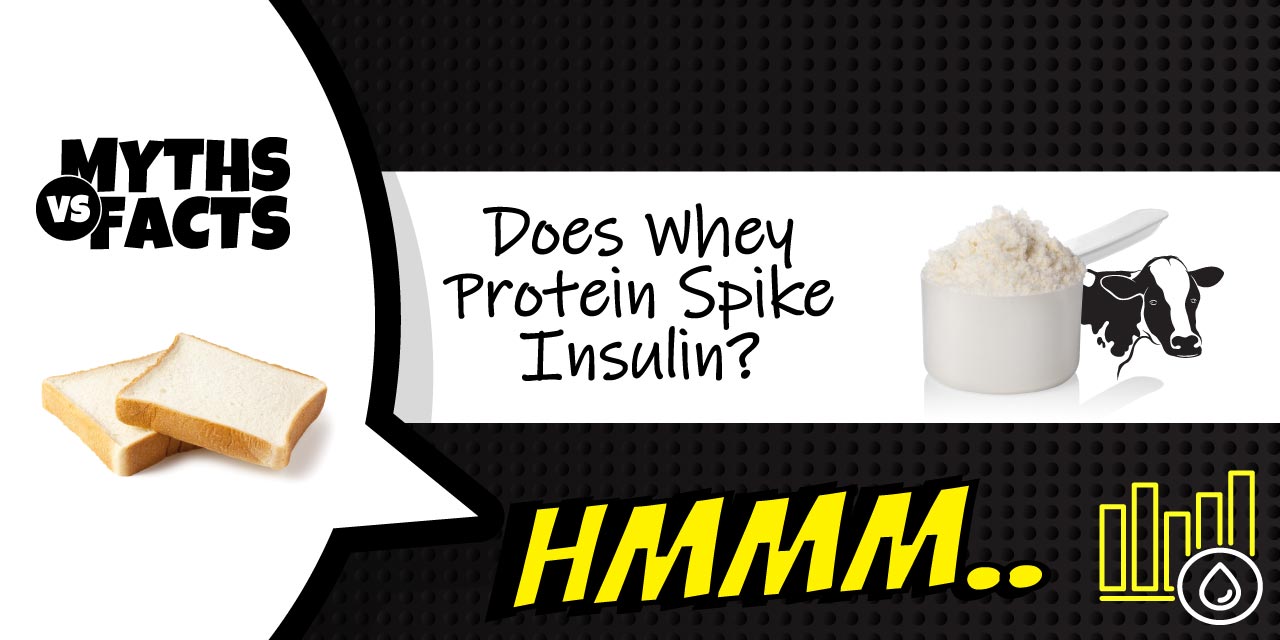Does Whey Protein Spike Insulin?

Does Whey Protein Spike Insulin?
AT AGN Roots, our customers and their questions are an excellent gauge for identifying what information promulgates across industry content.
In 2022 with the rise of plant-based powders, whey protein, in particular, has come under selective criticism for its postprandial (post-ingestion) insulin response.
While heavy metals dominate the plant-based protein space, attempts to diminish that focus by pumping our favorite sites with negative click-bait about whey is nothing new.
With a newly saturated dairy-alternative protein powder market, broadcasting the benefits of powdered cardboard (plant-proteins) alone is not converting customers at rates needed to support the current supplies. To help bolster demand, these failing brands are now waging a spam campaign against the dairy protein industry.
As the title of this article may suggest, such misinformation includes the infamous claim that “consuming whey protein elicits a greater insulin spike than consuming white bread.” This wildly misleading headline is presumably an effort to demonstrate the harmful effects of whey compared to pea, soy, or other plant-based proteins as a clever spin to say the branched-chain amino acid known as Leucine is somehow bad for you.
Luckily four customer-base remains reluctant to swallow such fallacy hooks without reaching out for clarity. The truth is that grass-fed whey continues to attract recognition as a vital and functional superfood. Studies demonstrate that whey protein with high-quality branched-chain amino acid concentrations abates postprandial glycemia (post-meal blood sugar spikes) via three mechanisms that suggest whey protein as nutrition capable of regulating bloodstreams to manage type-2 diabetes [2].
- Insulin response due to Leucine (Amino Acid)
- Phenomenon known as gastric emptying
- Reduction in Appetite / Appetite suppression
Grounded in the fundamentals of the scientific method without stretching or relying on pragmatic inferences, we hope to bolster efforts to challenge the growing business of any impartial or incomplete information campaigns designed to degrade the efficacy of dairy protein superfoods.
Does Whey Cause an Insulin & Glucose Response?
Although Insulin and glucose do share a relationship, they can just as likely move completely independent of each other in the same or opposite directions depending on a myriad of complex factors.
For the sake of this article's focus; below are two different paths that may lead to very similar whey protein insulinogenic responses.
- Eating a meal of carbohydrates (white bread) - The body will naturally release insulin to combat a spike in blood sugar due to postprandial glycemia impacts. Consuming a meal of carbohydrates broken down into glucose will certainly start down this response path spiking both glucose, followed by insulin.
- Enjoying Whey Protein Isolate Shake (AGN Roots + Water) - The body will secrete insulin into the bloodstream due to consuming the highly sought-after branched-chain amino acid (BCAA) "Leucine" within whey protein's nitrogen-based macro-nutrients. Insulin, in this case, provides the channel for BCAAs to enter your muscle tissue.
The above scenarios are too often conflated for the same result, not considering the negative impacts of a blood sugar spike from consuming carbs (white bread) nor the positive blood sugar management impacts observed when consuming protein.
Unfortunately, used to mislead consumers, false comparisons like this fail to examine the second-order effects of the insulin response generated by protein ingestion and equate insulin response with hyperinsulinemia (chronically elevated insulin), obviously a false premise.
When we lay people hear “high insulin”, we connote
- “high glucose”
- “insulin resistance”
- “diabetes”
Although these mechanisms are related, their complexity deserves respect and shouldn't be conflated with nonsensical marketing. In general "Hyperinsulinemia" shares a relationship with the ever growing obesity epidemic, the role this condition plays in fat synthesis has an entirely different path than the metabolic pathway that occurs with the consumption of whey protein [7].
The study in question itself acknowledges while insulin responses are similar between whey and white bread, the resulting blood glucose levels after ingesting whey are between 57% and 62% lower than following a meal of breads [1].
In summary, digesting whey protein with high concentrations of Leucine although elicits an insulin response should not be conflated with an insulin response to combat a spike in blood sugar from consuming sugar or carbohydrates.
Learn More: Benefits of Grass-Fed Whey
Learn More: Heavy Metals 101
Learn More: Superfood 101
Does Whey Protein Spike Insulin?
Yes, whey protein that contains a rich supply of amino acids has been shown to cause insulinotropic (affecting insulin production) effects. The infamous amino acid "Leucine," notable for its contribution to muscle building, is classified as an "initiator" of insulin secretion for its role in stimulating beta cells.
Is Whey Better than Casein for regulating Blood Sugar?
Yes, gastric emptying does not occur with all proteins. The environment of our stomach is acidic, which causes casein to coagulate (thicken like glue) and become very sticky. This "slow-digesting" casein attribute has its benefits; however, it is not gastric emptying.
Whey protein will remain in a liquid flowing form and thus is known as a "rapid release" protein form for how fast it moves through the system and is metabolized compared to other protein forms.
Does Whey Protein Stimulate Beta Cells?
The best analogy to describe the function of a Beta Cell is to describe it as a "fuel sensor." Pancreatic beta cells uniquely create, store, and are responsible for dispersing insulin into your blood in response to nutrient uptake.
When beta cells are activated, they release two hormones that work synergistically to lower blood sugar levels.
- Insulin - Reduces glucose levels in the bloodstream
- Amylin - Reduces the rate of glucose entering the bloodstream
Most of us are very familiar with the term "blood sugar" as it relates to the consumption of carbohydrate macros ultimately broken down through digestion into our body's most basic fuel - glucose.
When thinking about the food we consume and precisely the nutrients capable of "initiating" or "amplifying" the release of Insulin into the bloodstream, "glucose" is only a third of the story, albeit a dominant factor.
Nutrients with physiological roles in the release of Insulin include -
|
Nutrient
|
Role in Insulin Secretion
|
|
Glucose (Sugar, Carbohydrates)
|
Initiator + Amplifier
|
|
Amino Acids (Leucine-Protein)
|
Initiator
|
|
Fatty Acids (oils, nuts, seeds)
|
Initiator
|
The reason why whey protein is said to spike insulin is that it does. The mechanism of leucine's role on insulin levels has nothing to do with the body combatting high blood sugar, though this is the crucial difference to understand.
Why is Unflavored Whey Better?
Studies conclude that muscle-building amino acid "Leucine" enhances insulin release while lowering glucose concentrations in the blood. On the flip side, glucose paired with Leucine upon ingestion stimulates Insulin upwards by roughly five times that of Leucine alone [5].
The impacts are additive and give great reasons to limit the use of desert powders or highly sweetened tubs of BCAAs.
Why Does Whey Protein Spike Insulin?
Virtually all foods elicit an insulin response when consumed. Without insulin, the body would not have a path to convert glucose (blood sugar) into energy for use now or stored for later. Although infinite scenarios and compounding processes are at play, let's focus first on the big picture and the most obvious.
For a long time in the bodybuilding space, insulin was known as an "anabolic hormone." Protein fractions and Branched-chain amino acids rely on insulin to enter the body's soft tissues, where utilization to their fullest potential may occur. Without insulin in the bloodstream, our muscle cells would not be able to receive the incredible benefits associated with the consumption of whey protein.
Can Insulin Induced from Whey Protein Make Me Fat?
Unlike the pathway glucose from a meal can take to fuel fat synthesis, increased insulin-induced from ingesting unsweetened and unflavored whey protein powder intake does not lead to increases in fat mass or fat synthesis.
Learn More: Protein Fractions Explained
A simple 5 step process-check to ensure understanding -
- You consume food that the stomach and intestines break down into manageable pieces, much of which is pure fuel known as glucose (sugar).
- The lining of your digestive system allows glucose to be absorbed and enter the bloodstream. As the gut is digesting food, peptides known as incretins are released from the stomach and enter the bloodstream.
- As glucose concentrations build in the blood, the sugars stimulate clusters of cells known as beta cells.
- The pancreas recognizes the beta cells within the bloodstream, which subsequently triggers insulin release. Likewise, the pancreas will cease the release of insulin when no longer being exposed to new beta cells.
- Insulin attaches to receptors on cells all over the body. Muscle tissue will consume glucose for energy now, while the liver may pick up and store any excess by converting it to Glycogen.
What is Glycogen?
Glycogen is the converted glucose storage molecule held by the liver until it is called into play via the opposite hormone to insulin, known as glucagon, also secreted by the pancreas.
Glucagon secretion occurs when glucose levels in the bloodstream drop below normal levels, and the liver is called in to help by converting the stored glycogen back into glucose.
What is Insulin?
Insulin is a fundamental hormone released by the pancreas with the primary function of reducing blood glucose concentrations. Insulin is the only hormone in the body capable of lowering blood sugar.
When insulin is released into the bloodstream, it works in three ways to ensure a reduction in glucose levels.
- Stimulates the creation of glycogen
- Inhibits glycogen breakdown (glycogenolysis)
- Inhibits glucose synthesis from amino acids & glycerol (gluconeogenesis).
Our Insulin response to ingesting food is the most basic and essential function of our metabolic system.
Learn More: Metabolic Confusion Explained
What is the Diabetes Connection?
The defining characteristic of diabetes is a disease characterized by the impairment of insulin function resulting in elevated glucose levels in the bloodstream (hyperglycemia) and urine.
The two most popular diagnoses for failed insulin function include two common diabetes types -
Type 1 - The body doesn't produce enough insulin due to the immune system attacking beta cells.
Type 2 - The response to insulin is ineffective.
Understanding the implications of our diet and our associated physiological response is serious; in general, too much glucose in the blood for too long is bound to yield damaging consequences. When our insulin function is impaired, glucose levels in the blood become unpredictable.
The negative impacts of such impairment may result in conditions such as -
- Cardiovascular Failure & Stroke
- Nerve Damage
- Kidney Failure
Can Whey Protein Cause Insulin Resistance?
Insulin Resistance (IR) is considered "prediabetes" (type 2) in which glucose has the potential to reach higher than normal concentration levels in the blood (hyperglycemia) as the body's cells are not effectively responding to insulin.
The insulin stimulated by consuming protein does not contribute to what the medical community known as Insulin Resistance (IR).
IR is relevant to the relationship between insulin and glucose but not insulin & amino acids. For leucine (a prominent BCAA within whey protein) consumption to share the same fate as glucose, one must over-consume by unpractical magnitudes.
Learn More: BCAAs in Grass-Fed Whey Protein
Does Whey Protein Impact Blood Sugar?
Glucose is the primary food substrate used for energy in our bodies, and insulin is a hormone whose purpose is to distribute glucose from the blood into cells in need of energy.
Although our bodies can convert protein into glucose for energy, it is not as direct as energy from ingesting carbohydrates and sugars. The alternative process our body relies on converting glucose into energy from digested protein or broken down tissue in starvation mode (muscle cannibalization) is called gluconeogenesis.
When we begin a meal, the body is brilliant in responding accordingly. The body notices blood sugar on the rise and instantly prepares via insulin secretion.
Glycemic Index: Whey Protein vs White Bread?
Every food item that contains a carbohydrate macro can have an associated glycemic index value. The value ranges from 0 to 100, with 100 being a pure carbohydrate (glucose) with an immediate impact on blood sugar levels. The higher the glycemic index value, the greater the effect on blood sugar levels.
| Food Item | Glycemic Index |
| Whole Wheat Bread | 74 |
| White Bread | 75 |
| Whole Milk | 39 |
| Skim Milk | 37 |
Suppose you are curious about the glycemic index value assigned to whey protein isolate. In that case, the answer is that there is no value assigned as theoretically without carbohydrates, which is not applicable.
Food Insulin Index: Whey Protein vs White Bread?
While pure protein sources have a meager glycemic index score, they often measure high on the insulin index. For example, beef and fish release just as much insulin as brown rice.
We see deleterious effects when blood sugar remains elevated; insulin response is key to clearing excess glucose from the bloodstream. The scientific community understands that consuming whey protein on its own reduces postprandial glycemia and stimulates beta cells to release, thus supporting its whey as a glycemic regulator with an insulinemic response [9].
In other words, protein consumption has been demonstrated to reduce serum glucose levels post-consumption and helps regulate this critical piece of the metabolic system.
If a high insulin response is not concerning in and of itself, what questions should we be asking regarding our protein intake? What factors are relevant to our health, and how can we tease that apart?
Can Whey Protein Help Manage Blood Sugar?
As a complete protein and essential nutrient vital to our health, whey protein intake is undoubtedly correlated to longevity, favorable body composition, athletic performance, hormonal balance, and managing blood glucose concentrations.
Further, if we are interested in eating to prevent diabetes and other metabolic diseases, protein confers further benefits.
Protein consumption is associated with higher satiety, which leads to less over-consumption and fewer cravings.
Protein has a higher thermic effect than other macronutrients, meaning it takes more energy to break down, enhancing your resting metabolic rate.
The Type of Protein Matters
If we know we should eat protein, then what types of protein should we eat?
What protein sources are best?
Let’s unpack. Is whey the only protein source that causes an insulin spike, and is this surge excessive? We know animal proteins elicit an insulin response similar to dense carbohydrates (brown rice). This is true of plant-based proteins, so no, whey does not cause an undue insulin spike compared to the insulin response to other protein sources, including plant-based sources.
As we’ve discussed, protein clears post-ingestion glucose faster than carbohydrates and correlates with similar insulin responses. The insulin response to protein is not significantly different between proteins, nor is it the most relevant factor in choosing which dietary protein to consume.
Our bodies need “complete proteins.” This means that we need protein sources that, either alone or combined, provide us with all essential amino acids. Animal proteins (such as beef, fish, whey, and eggs) are all naturally complete proteins. Plant-based proteins are individually incomplete, though often combined to create more comprehensive profiles.
An amino acid profile should not be the only consideration. Bioavailability measures how efficiently our bodies can use nutrients in each food; bioavailability and nutrient density should also be considered when choosing a protein source.
Here too, animal proteins are superior to plant proteins. They are more easily absorbed and used by our bodies and come packaged with more nutrients per comparative serving than their plant-based counterparts.
Whey Protein with Type 2 Diabetes?
The short answer here is yes.
Yes, AGN Roots Grass-Fed Whey with no flavors or sweeteners is about as healthy as it gets if your gut health is normal.
To readdress the initial claims drawing a false connection between the insulin response from whey protein and proportionate response in elevated insulin levels due to spiked blood sugar from consuming white bread is and always will be a stretch in throwing shade at the benefits of whey protein.
Some facts to consider in summary -
- All dense proteins (high protein per ounce) elicit an insulin response similar to dense carbohydrates and by design.
- Insulin response from whey and a glycemic response that elicits an insulin response, as a result, are not the same thing.
- Protein and carbohydrates differ in their post-ingestion efficacy of that insulin response in clearing glucose. In healthy individuals, we want to see insulin response correlating with glucose being removed from the blood – this is what we see with protein in general and whey in particular.
- Numerous studies are exploring whey as a therapy to enhance insulin response in Type 2 diabetics. Whey is a fast-acting, complete, bioavailable protein source that can meet various individual protein needs.
If you choose whey as your protein superfood, there are very few downsides if your body is healthy and your digestive system welcoming.



2 comments
I have heard that after a hard physical workout, especially with weights that it is best to supplement the whey protein with twice as much dextrose powder. Is the dextrose really necessary?
is your protein good for neuropthy .